高考英语语法一点通课件——Lesson 8 情态动词
文档属性
| 名称 | 高考英语语法一点通课件——Lesson 8 情态动词 | 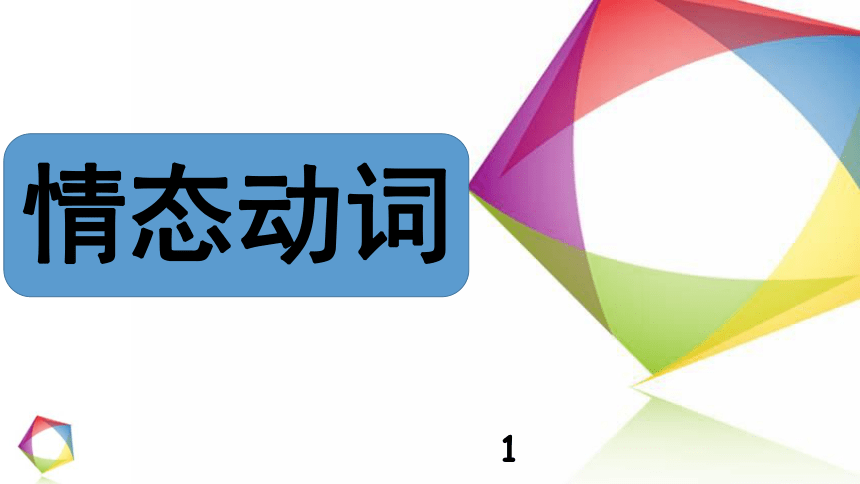 | |
| 格式 | pptx | ||
| 文件大小 | 263.9KB | ||
| 资源类型 | 试卷 | ||
| 版本资源 | 通用版 | ||
| 科目 | 英语 | ||
| 更新时间 | 2022-04-11 14:52:47 | ||
图片预览

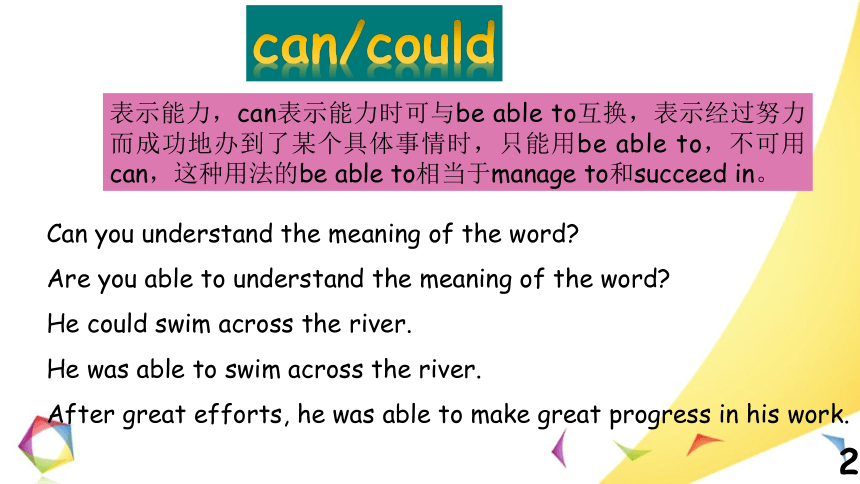
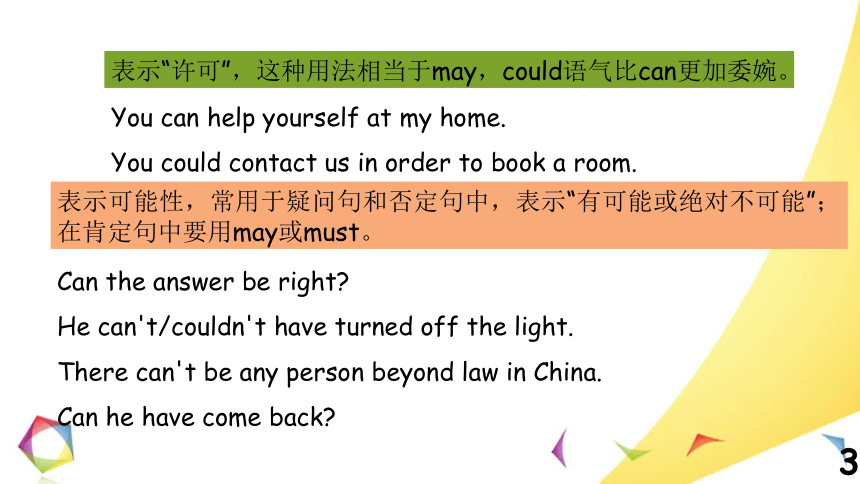
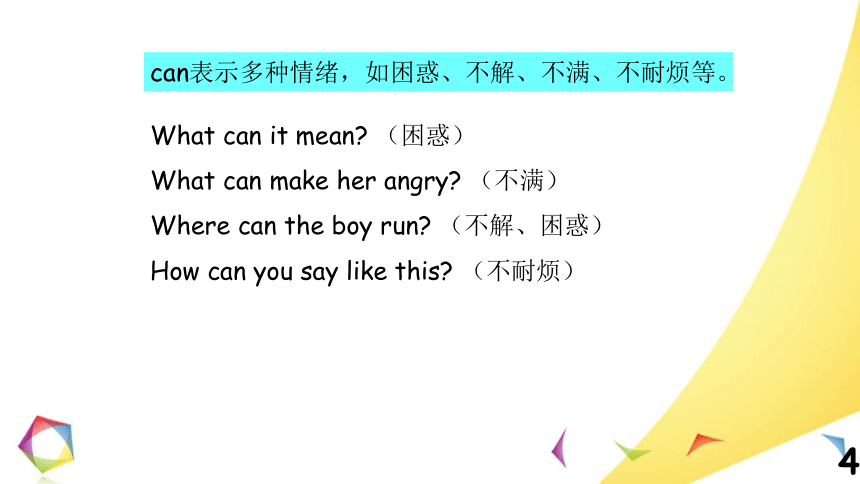
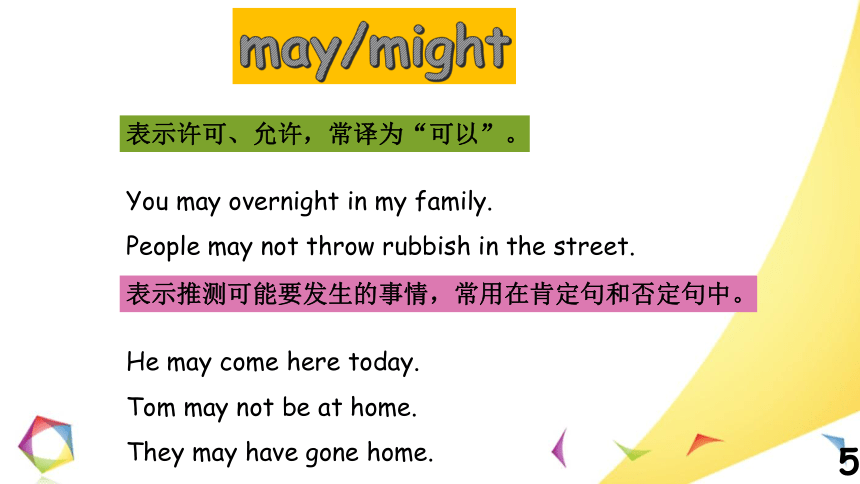
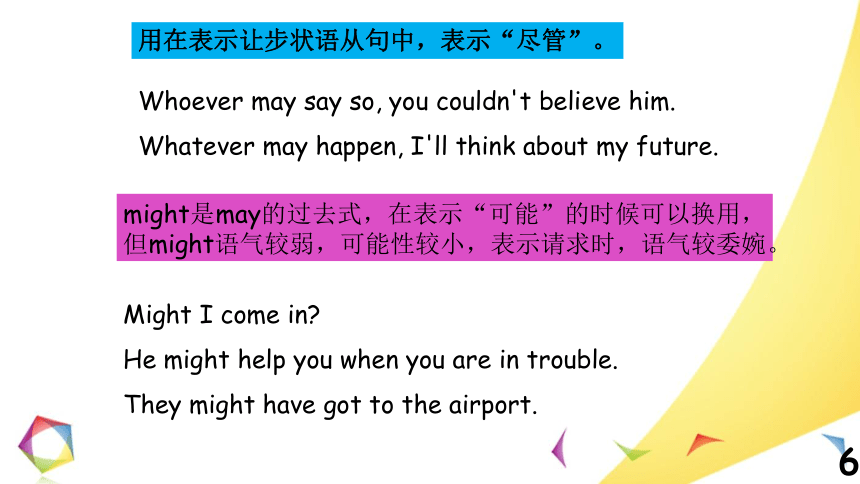
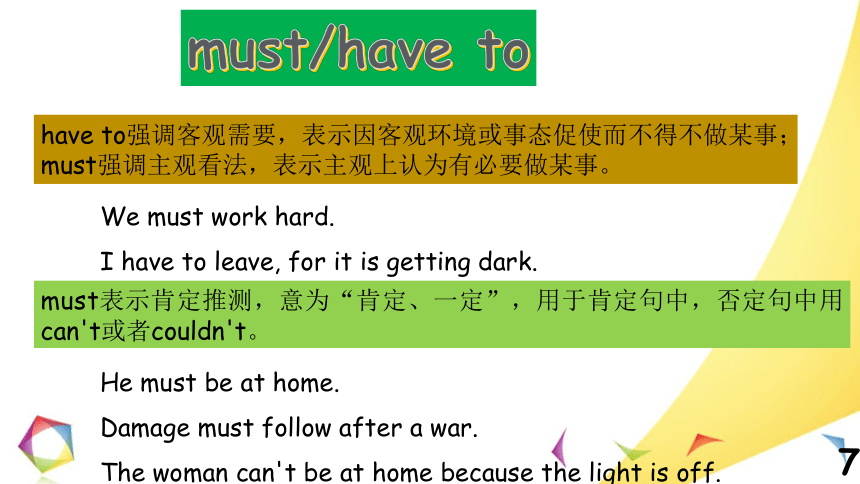
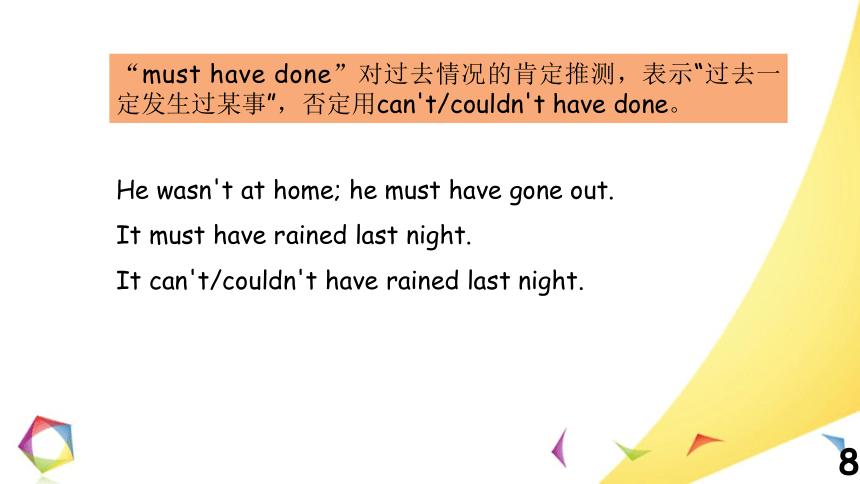
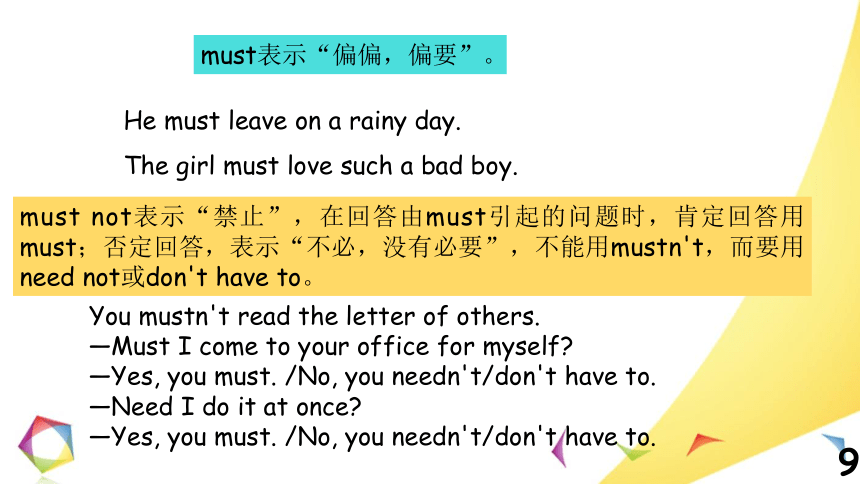
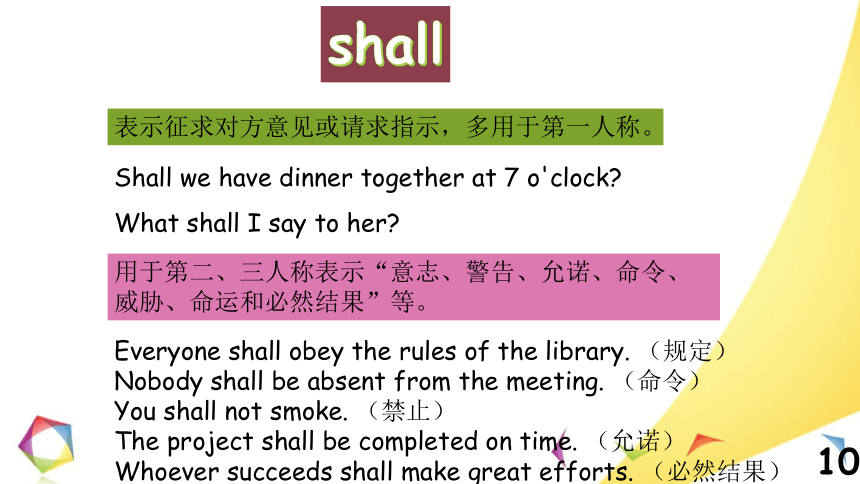
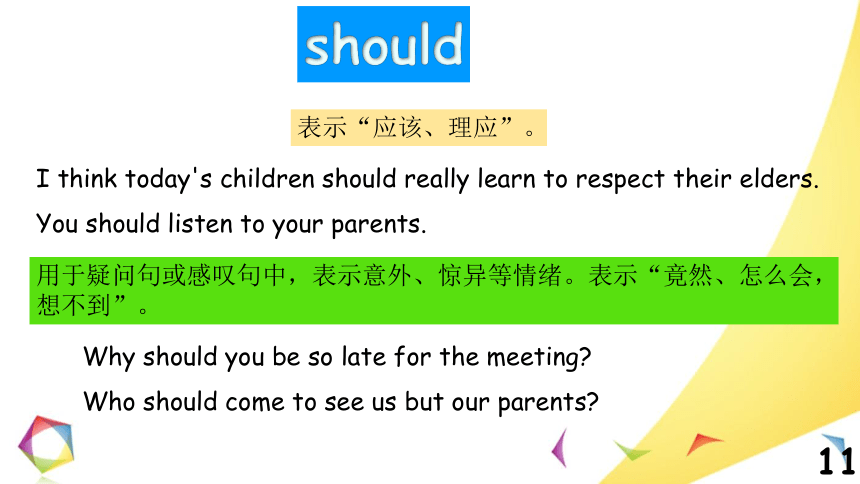
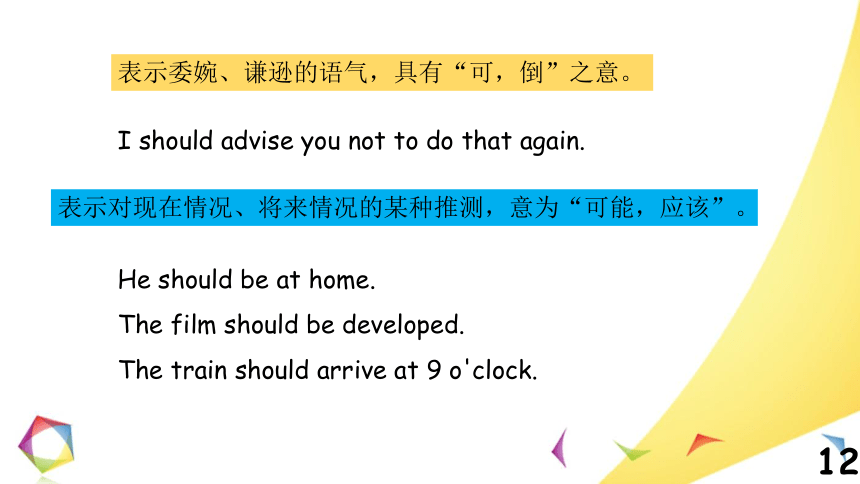
文档简介
(共30张PPT)
情态动词can/could表示能力,can表示能力时可与be able to互换,表示经过努力而成功地办到了某个具体事情时,只能用be able to,不可用can,这种用法的be able to相当于manage to和succeed in。Can you understand the meaning of the word Are you able to understand the meaning of the word He could swim across the river.He was able to swim across the river.After great efforts, he was able to make great progress in his work.表示“许可”,这种用法相当于may,could语气比can更加委婉。You can help yourself at my home.You could contact us in order to book a room.表示可能性,常用于疑问句和否定句中,表示“有可能或绝对不可能”;在肯定句中要用may或must。Can the answer be right He can't/couldn't have turned off the light.There can't be any person beyond law in China.Can he have come back can表示多种情绪,如困惑、不解、不满、不耐烦等。What can it mean (困惑)What can make her angry (不满)Where can the boy run (不解、困惑)How can you say like this (不耐烦)may/might表示许可、允许,常译为“可以”。You may overnight in my family.People may not throw rubbish in the street.表示推测可能要发生的事情,常用在肯定句和否定句中。He may come here today.Tom may not be at home.They may have gone home.用在表示让步状语从句中,表示“尽管”。Whoever may say so, you couldn't believe him.Whatever may happen, I'll think about my future.might是may的过去式,在表示“可能”的时候可以换用,但might语气较弱,可能性较小,表示请求时,语气较委婉。Might I come in He might help you when you are in trouble.They might have got to the airport.must/have tohave to强调客观需要,表示因客观环境或事态促使而不得不做某事;must强调主观看法,表示主观上认为有必要做某事。We must work hard.I have to leave, forit is getting dark.must表示肯定推测,意为“肯定、一定”,用于肯定句中,否定句中用can't或者couldn't。He must be at home.Damage must follow after a war.The woman can't be at home because the light is off.“must have done”对过去情况的肯定推测,表示“过去一定发生过某事”,否定用can't/couldn't have done。He wasn't at home; he must have gone out.It must have rained last night.It can't/couldn't have rained last night.must表示“偏偏,偏要”。He must leave on a rainy day.The girl must love such a bad boy.must not表示“禁止”,在回答由must引起的问题时,肯定回答用must;否定回答,表示“不必,没有必要”,不能用mustn't,而要用need not或don't have to。You mustn't read the letter of others.—Must I come to your office for myself —Yes, you must. /No, you needn't/don't have to.—Need I do it at once —Yes, you must. /No, you needn't/don't have to.shall表示征求对方意见或请求指示,多用于第一人称。Shall we have dinner together at 7 o'clock What shall I say to her 用于第二、三人称表示“意志、警告、允诺、命令、威胁、命运和必然结果”等。Everyone shall obey the rules of the library. (规定)Nobody shall be absent from the meeting. (命令)You shall not smoke. (禁止)The project shall be completed on time. (允诺)Whoever succeedsshall make great efforts. (必然结果)should表示“应该、理应”。I think today's children should really learn to respect their elders.You shouldlisten to your parents.用于疑问句或感叹句中,表示意外、惊异等情绪。表示“竟然、怎么会,想不到”。Why should you be so latefor the meeting Who should come to see us but our parents 表示委婉、谦逊的语气,具有“可,倒”之意。I should advise you not to do that again.表示对现在情况、将来情况的某种推测,意为“可能,应该”。He should be at home.The film should be developed.The train should arrive at 9 o'clock.will/would表示请求,will和would可互换,而would更委婉Will you come with me Would you please tell me the way to the cinema 表示推测,will表示推测时把握性较大,但没有must大,否定推测则用won't。It will be the baby of Susan crying in the room.It would be 8 o'clock when he arrived at the school.He is just a little boy. He won't know so much about our society.表示必然性的客观事实。All men will die.Oil will float on the water.had betterhad better表示“最好”,后跟动词原形作宾语,否定式为had better notdo,疑问句把had放在主语前,反意疑问句借助had或hadn't。He'd better start out immediately.Had he better start out immediately He'd better not start out immediately.He'd better start out immediately, hadn't he would ratherwould rather表示“宁愿、宁可”,后接动词原形,would rather…than…表示“宁愿…而不…”,两部分均接动词原形。He would rather drop out of school.The hero would rather die than give in to the enemy.wouldrather+have done表示“宁愿已经做过某事,实际上没有做”。I would rather have told it to her.ought to表示理应做的事,应该做的事,意为“应该、应当”。She ought to put more energy into her study.He oughtn't to look down upon the poor.表示推测,意为“应是,应该,会是”。What she said ought to be true.used to/wouldused to表示“过去常常做某事”,used to的疑问句、否定句和反意疑问句可以直接用助动词used或者借助助动词did。used to强调过去常常做某事,而现在不做了;而would强调过去的一种习惯,现在可能依然存在也有可能不存在了。He used to live there.Used he to live there (=Did he use to live there )He usedn't to live there.(=He didn't use to live there.)He used to live there, usedn't/didn't he He used to be a heavy-smoker but he has got rid of the bad habit.He would walk in the park with his lovely pet.need/dare情态动词need/dare常用于疑问句、否定句,而实义动词need/dare常用于肯定句中。He needs to do some housework for his mother today.You needn't come so early.Need you have an examination Dare you dive deep into the water The shy girl dare not say to others.He dares to speak in public.may wellmay well+动词原形表示“理应、有足够理由做某事”。You may well stick to your opinion.Everyone may well perform their right.may/might as well+动词原形,为了加强语气也可加上副词just,相当于had better,表示“不妨,还不如”。may/might (just) as wellThere's little chance to succeed, you might/may as well give up.情态动词+have donemay/might have done用于推测过去的行为,表示“可能已经”。He may have arrived yesterday.The man may have married two years ago.might have done还表示过去应该做而没做的事,表示“本能够”。The patient might have followed the doctor's suggestions.can/could have done对过去情况的推测,表示“可能”,常用于疑问句和否定句中。Where can (could) she have gone It can't have rained, for the ground is dry.表示过去能做而没做的事,表示一种惋惜之情,意为“本可以”。He could have passed the examif he studied hard.must have done表示对过去行为的推断,表示“一定、想必”。He must have made great efforts.needn't have done表示过去没有必要做某事,而实际上做了。You needn't have put clothes out to dry, for it is cloudy.should/ought to have done肯定形式表示“本应该做某事,实际没有做”;否定形式表示“本不应该做某事,但是实际做了”。You should/ought tohave followed his advice.The distance is short. We shouldn't/oughtn't tohave taken a taxi.would rather have done表示“宁愿做过某事,实际上没有做”。I would rather have finished the final exam.情态动词表示推测,可能性大小排序mustshouldwillmay>>>might>1. Days later, my brother called to say he was all right, but___say where he was. A. mustn’tB.shouldn’t C. wouldn’t D. mightn’t2.It was sad to me that they, so poor themselves, ________ bring me food.A. might B. would C. should D. could3.---Why! I couldn’t get you on the phone this morning.--- We _____ tennis in the yard when you phoned me.A. could be playing B. must be playingC. must have been playing D. should have played4. When we worked in the same office, we _____ often have coffee together.A. would B. should C. could D. ought to5. ---May I smoke here ---If you ___, choose a seat in the smoking section.A. must B. may C. can D. should
情态动词can/could表示能力,can表示能力时可与be able to互换,表示经过努力而成功地办到了某个具体事情时,只能用be able to,不可用can,这种用法的be able to相当于manage to和succeed in。Can you understand the meaning of the word Are you able to understand the meaning of the word He could swim across the river.He was able to swim across the river.After great efforts, he was able to make great progress in his work.表示“许可”,这种用法相当于may,could语气比can更加委婉。You can help yourself at my home.You could contact us in order to book a room.表示可能性,常用于疑问句和否定句中,表示“有可能或绝对不可能”;在肯定句中要用may或must。Can the answer be right He can't/couldn't have turned off the light.There can't be any person beyond law in China.Can he have come back can表示多种情绪,如困惑、不解、不满、不耐烦等。What can it mean (困惑)What can make her angry (不满)Where can the boy run (不解、困惑)How can you say like this (不耐烦)may/might表示许可、允许,常译为“可以”。You may overnight in my family.People may not throw rubbish in the street.表示推测可能要发生的事情,常用在肯定句和否定句中。He may come here today.Tom may not be at home.They may have gone home.用在表示让步状语从句中,表示“尽管”。Whoever may say so, you couldn't believe him.Whatever may happen, I'll think about my future.might是may的过去式,在表示“可能”的时候可以换用,但might语气较弱,可能性较小,表示请求时,语气较委婉。Might I come in He might help you when you are in trouble.They might have got to the airport.must/have tohave to强调客观需要,表示因客观环境或事态促使而不得不做某事;must强调主观看法,表示主观上认为有必要做某事。We must work hard.I have to leave, forit is getting dark.must表示肯定推测,意为“肯定、一定”,用于肯定句中,否定句中用can't或者couldn't。He must be at home.Damage must follow after a war.The woman can't be at home because the light is off.“must have done”对过去情况的肯定推测,表示“过去一定发生过某事”,否定用can't/couldn't have done。He wasn't at home; he must have gone out.It must have rained last night.It can't/couldn't have rained last night.must表示“偏偏,偏要”。He must leave on a rainy day.The girl must love such a bad boy.must not表示“禁止”,在回答由must引起的问题时,肯定回答用must;否定回答,表示“不必,没有必要”,不能用mustn't,而要用need not或don't have to。You mustn't read the letter of others.—Must I come to your office for myself —Yes, you must. /No, you needn't/don't have to.—Need I do it at once —Yes, you must. /No, you needn't/don't have to.shall表示征求对方意见或请求指示,多用于第一人称。Shall we have dinner together at 7 o'clock What shall I say to her 用于第二、三人称表示“意志、警告、允诺、命令、威胁、命运和必然结果”等。Everyone shall obey the rules of the library. (规定)Nobody shall be absent from the meeting. (命令)You shall not smoke. (禁止)The project shall be completed on time. (允诺)Whoever succeedsshall make great efforts. (必然结果)should表示“应该、理应”。I think today's children should really learn to respect their elders.You shouldlisten to your parents.用于疑问句或感叹句中,表示意外、惊异等情绪。表示“竟然、怎么会,想不到”。Why should you be so latefor the meeting Who should come to see us but our parents 表示委婉、谦逊的语气,具有“可,倒”之意。I should advise you not to do that again.表示对现在情况、将来情况的某种推测,意为“可能,应该”。He should be at home.The film should be developed.The train should arrive at 9 o'clock.will/would表示请求,will和would可互换,而would更委婉Will you come with me Would you please tell me the way to the cinema 表示推测,will表示推测时把握性较大,但没有must大,否定推测则用won't。It will be the baby of Susan crying in the room.It would be 8 o'clock when he arrived at the school.He is just a little boy. He won't know so much about our society.表示必然性的客观事实。All men will die.Oil will float on the water.had betterhad better表示“最好”,后跟动词原形作宾语,否定式为had better notdo,疑问句把had放在主语前,反意疑问句借助had或hadn't。He'd better start out immediately.Had he better start out immediately He'd better not start out immediately.He'd better start out immediately, hadn't he would ratherwould rather表示“宁愿、宁可”,后接动词原形,would rather…than…表示“宁愿…而不…”,两部分均接动词原形。He would rather drop out of school.The hero would rather die than give in to the enemy.wouldrather+have done表示“宁愿已经做过某事,实际上没有做”。I would rather have told it to her.ought to表示理应做的事,应该做的事,意为“应该、应当”。She ought to put more energy into her study.He oughtn't to look down upon the poor.表示推测,意为“应是,应该,会是”。What she said ought to be true.used to/wouldused to表示“过去常常做某事”,used to的疑问句、否定句和反意疑问句可以直接用助动词used或者借助助动词did。used to强调过去常常做某事,而现在不做了;而would强调过去的一种习惯,现在可能依然存在也有可能不存在了。He used to live there.Used he to live there (=Did he use to live there )He usedn't to live there.(=He didn't use to live there.)He used to live there, usedn't/didn't he He used to be a heavy-smoker but he has got rid of the bad habit.He would walk in the park with his lovely pet.need/dare情态动词need/dare常用于疑问句、否定句,而实义动词need/dare常用于肯定句中。He needs to do some housework for his mother today.You needn't come so early.Need you have an examination Dare you dive deep into the water The shy girl dare not say to others.He dares to speak in public.may wellmay well+动词原形表示“理应、有足够理由做某事”。You may well stick to your opinion.Everyone may well perform their right.may/might as well+动词原形,为了加强语气也可加上副词just,相当于had better,表示“不妨,还不如”。may/might (just) as wellThere's little chance to succeed, you might/may as well give up.情态动词+have donemay/might have done用于推测过去的行为,表示“可能已经”。He may have arrived yesterday.The man may have married two years ago.might have done还表示过去应该做而没做的事,表示“本能够”。The patient might have followed the doctor's suggestions.can/could have done对过去情况的推测,表示“可能”,常用于疑问句和否定句中。Where can (could) she have gone It can't have rained, for the ground is dry.表示过去能做而没做的事,表示一种惋惜之情,意为“本可以”。He could have passed the examif he studied hard.must have done表示对过去行为的推断,表示“一定、想必”。He must have made great efforts.needn't have done表示过去没有必要做某事,而实际上做了。You needn't have put clothes out to dry, for it is cloudy.should/ought to have done肯定形式表示“本应该做某事,实际没有做”;否定形式表示“本不应该做某事,但是实际做了”。You should/ought tohave followed his advice.The distance is short. We shouldn't/oughtn't tohave taken a taxi.would rather have done表示“宁愿做过某事,实际上没有做”。I would rather have finished the final exam.情态动词表示推测,可能性大小排序mustshouldwillmay>>>might>1. Days later, my brother called to say he was all right, but___say where he was. A. mustn’tB.shouldn’t C. wouldn’t D. mightn’t2.It was sad to me that they, so poor themselves, ________ bring me food.A. might B. would C. should D. could3.---Why! I couldn’t get you on the phone this morning.--- We _____ tennis in the yard when you phoned me.A. could be playing B. must be playingC. must have been playing D. should have played4. When we worked in the same office, we _____ often have coffee together.A. would B. should C. could D. ought to5. ---May I smoke here ---If you ___, choose a seat in the smoking section.A. must B. may C. can D. should
